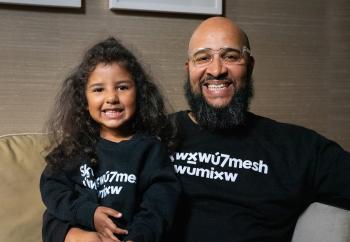Image Caption
Summary
Local Journalism Initiative Reporter
Windspeaker.com
On Feb. 21, International Mother Language Day, the First Peoples’ Cultural Council (FPCC) celebrated the 20th anniversary of FirstVoices.com with the launch of a new version of its free, open-source, Indigenous language platform.
Sicarii Leeland Askew said the FirstVoices technology is a force for cultural revitalization and community empowerment.
FPCC has a legislated mandate to protect, revitalize and enhance the heritage, languages, cultures and arts of First Nations in British Columbia. Sicarii, (Sḵwxw̱ ú7mesh) works as the web page administrator for his community’s language page, with the team developing technology to support language learning.
The technology tools of FirstVoices are designed to support multiple languages, dialects, written and spoken materials, keyboards, apps and recordings.
FirstVoices’ language pages are completely owned by communities, so the website reflects a wide range of experts in more than 85 languages, now growing to include Indigenous languages from around the globe.
Communities create secure, interactive language sites online by uploading audio recordings, words, phrases, songs and stories to be shared with others. Some content is not for public audiences, such as family stories, sacred songs, regalia and dances seen only in community ceremonies. Communities can keep those private with a secure login, and communities will always have full ownership of their pages.
“FPCC is honoured to see youth and Elders alike embracing the technology and working with the site administrators to create vital language resources to support language learning and fluency now and for generations to come,” said FPCC CEO Tracey Herbert.
Sicarii said the new features enable users to add more customized pages and widgets to better suit their community's language learning needs. The redesign took into consideration how to be inviting and functional in order to appeal to a wide age range “from Elders to toddlers,” Sicarii said. Whether using their cell phone, iPad/tablets or computer, he says the focus was on making their website “a positive learning environment.”
Dr. Lorna Wánosts’a7 Williams, is board chair for FPCC’s sister organization, and partner for FirstVoices.com, the First Peoples’ Cultural Foundation, an Indigenous-led charitable society.
Williams said, “FirstVoices is a great example of how First Peoples all over the planet have used new technologies to protect and maintain their knowledge systems, languages and relationships.”
Sicarii debunks the common framing of languages being “lost,” reminding us it was due to oppression via colonialism.
“We did not lose our Sḵwx̱wú7mesh sníchim language. It was taken from us, so our Elders wouldn’t speak the language and they wouldn’t encourage their children to speak the language.”
He remembers there being 13 speakers in his community, and he’s proud of the growth to more than 50 today. “There seems to be this uprising.”
At home he uses FirstVoices with his four-year-old daughter “to bring the language back and make our ancestors proud.”
“Learning should be fun,” he said, and so the tech team has worked towards incorporating visuals and videos into the site.
FirstVoices has an immersion toggle, so the site can transform to be fully in a language. Interactive features include uploading videos or playing games, such as “Wordsy,” where users can input their own words, and the tool mixes them into a puzzle.
“As Skwxwú7mesh people, our language work approach coincides with that of our longhouse teachings. ‘We're all relatives and family and treat it as such.”
Although Sicarii’s background as a creative producer, recording artist and filmmaker has taken him around the world, he felt a pull towards his own language.
“I always had this sixth sense that I was going to end up recording in the language. I just had a feeling.”
As a father, he started thinking “about ways you can spend more time with (your children) and be more supportive and do things together.”
When his daughter Leilani enrolled into a Sḵwxw̱ ú7mesh sníchim immersion program, he said “she's coming home speaking the language and I thought ‘I can't have her schooling me up. I have to be the example’.”
Sicarii reflects on how his paths merged into working with his language for FirstVoices.
“It's kind of funny how it worked. I had the ability with the technology, equipment, recording, interfaces, software,” he said, and transitioned to use his “skills and abilities to contribute to something greater than myself, to help my community, to contribute.”
Working with FirstVoices opened a new chapter of working with Elders, and in working with the community with language Sicarii has seen the transformative power of language.
“There's a lot of healing in the work to open up, and to speak the language and to empower yourself through the language and to connect with our old ways,” he said.
“What happens is you start to realize, and now I understand my mother's trauma and her grandmother's, and now I know why she didn't speak the language,” Sicarii said.
“So now I know I have to teach my daughter the opposite, to speak the truth and not be afraid, and not be ashamed, to be proud,” he said.
“And at the end of the day, it's going to be our children who benefit. They're not going to have to go through that. They're going to learn the old ways, to speak the truth and speak the language. Speak it proud and speak it boldly.”

